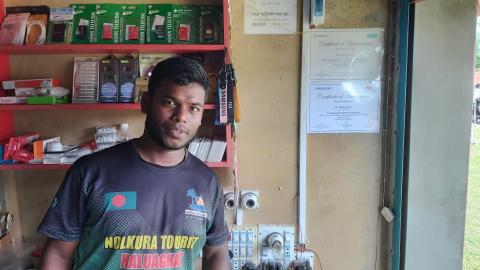
Supporting vulnerable entrepreneurs and farmers in Bangladesh

ADA recently completed two pilot projects in Bangladesh with the NGO Friendship Bangladesh. The first involved setting up agricultural and solar equipment vending points and consultation facilities, called SED hubs, in vulnerable communities. The second provided solar-powered irrigation pumps and agricultural machinery to groups of farmers.
The Brahmaputra River is dotted with sand islands called chars that form and disappear during the dry and rainy seasons, depending on water levels. While fertile, these islands remain temporary. They are home to some five million people who are poor, marginalised and vulnerable to climate change.
The NGO Friendship Bangladesh was set up to provide these communities with access to basic services, medical care, education as well as entrepreneurial support, thereby improving their livelihoods and lifting them out of poverty.
A longstanding partnership with Friendship Bangladesh
ADA has a longstanding partnership with Friendship Bangladesh and its Luxembourg-based branch. Under this partnership, ADA contributed to building the capacity of the Friendship Bangladesh-founded microfinance institution (MFI) Mushti, for example by providing technical assistance to improve Mushti’s financial and social performance.
In line with its current strategy, ADA has broadened its scope of action from specific support for MFIs to a broader value chain approach, with a particular focus on strengthening agricultural value chains, entrepreneurship and the provision of basic services. To this end, ADA recently completed two test projects in collaboration with Friendship Bangladesh.
Diversification of community service centres
While Friendship Bangladesh had already trained technicians in solar energy and animal health in selected villages, one of the test projects involved training these two types of technicians to become both farming and solar energy experts. This enables them to offer a full range of supplies, equipment and advice to communities through vending points, called SED hubs, located directly within the communities.
As part of the test project, ADA financed the development of training modules and the organisation of two five-day training courses which enabled 40 entrepreneurs to acquire farming and solar energy skills. At the end of the course, the entrepreneurs were given a starter kit for installing, maintaining and repairing solar equipment. The kit also included hybrid seeds from various flood- and drought-resistant crops as well as veterinary supplies such as worming tablets and mineral supplements.
Nowadays, the SED hubs created by the entrepreneurs trained through this test project supply farmers and fishermen with affordably priced, high-quality seeds, fertilisers, solar-powered equipment, electronic devices and mobile charging stations. They also provide valuable agricultural information such as yield statistics, weather forecasts and machine operating instructions. The owners of these SED hubs are therefore genuine entrepreneurs who contribute to economic growth within their community.
While the start-up kits are funded through grants, the entrepreneurs will be able to rely on loans from Mushti for their companies’ future financing needs. To this end, ADA continues to support Mushti in developing its loan portfolio.

Solar-powered irrigation system and agricultural machiner
Char dwellers can only grow rice during the monsoon season as irrigation systems are very costly. However, the disastrous flash flooding that regularly affects the chars ravages their crops, leading to significant losses and exacerbating their already difficult living conditions.
To alleviate this situation, ADA and Friendship Bangladesh have rolled out a test project to install solar pumps for groups of farmers, managed independently by a designated person in charge. The solar pumps can be used effectively to irrigate rice crops, but also to extend the growth period into the dry season, while encouraging sustainable agriculture and environmental protection.
During the rainy season, when irrigation is no longer needed, the energy produced by the solar panels is redirected into agricultural processing that was previously fuelled by expensive, polluting diesel. Thanks to solar-powered threshers and dryers, the value of agricultural products can now be increased and post-harvest losses significantly reduced.
In the case of flooding, all this equipment can be quickly dismantled, as was the case at the end of this test project. The irrigation pumps and agricultural processing equipment were relocated to another area that producers had moved back to.
The solar pumps not only increased agricultural yields fivefold at a lower cost, but also reduced greenhouse gas emissions and eliminated noise pollution as they replaced old diesel engines. The solar panels were also used to power 30 homes on each char during the dry season, improving living conditions for these households and providing them with new economic opportunities.
Outlook
Friendship Bangladesh will draw on the lessons learned from these test projects to roll out the solar irrigation model on a wider scale and increase the number of SED hubs in various villages. Note that these two models can be integrated: it is possible for an SED hub manager to also become an irrigation system manager.